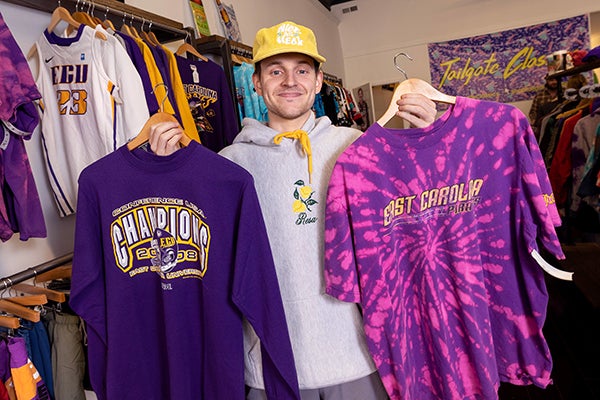A1-Template Post 3
This title can be used to explain a little more about the research
April Kelly has taken some guidance from programs and experts at East Carolina University and turned it into the building blocks of a company she hopes will give parents a vegan alternative to baby formula.
Kelly started with the Small Business and Technology Development Center and from there went to I-Corps@ECU and Accelerate Rural NC (ANRC) to build her business plan for Sure! That helped her garner a $10,000 N.C. Idea Micro Grant in October — one of only 22 businesses selected and the only from Greenville.

April Kelly is building her vegan baby formula business with help from experts at ECU. (Contributed photo)
“I’m currently in the process of manufacturing my first batch of product to launch out in the market,” Kelly said. “I’m 100% positive that the ECU I-Corps program really made the difference (in attaining the grant). Through our participation we were able to (narrow) down our target audience and clearly distinguish our customer profile through customer discovery.”
Sure! is based in Greenville with production in Raleigh. “It is our goal to plant roots here in Greenville and manufacture our product in-house within the next three to five years,” Kelly said. “Part of our mission is to provide jobs throughout our community.”
Entrepreneurs such as Kelly are why ECU is bullish on programs that help new and growing businesses.
“ECU supports new and small business growth across the state through several programs and resources dedicated to entrepreneurs,” said Rachel Bridgers, a business counselor with the Small Business and Technology Development Center at ECU. “Through this business ecosystem, ECU is well-positioned to drive transformation in our rural communities through our services, resources and community partners.”
ARNC focuses on helping small businesses in rural regions gain access to global markets with innovative products. The rural business accelerator hosts 10-week networking and learning sessions for cohorts of 20 business owners. The program has funding through July.
Since it began in September 2020, the program has helped 125 companies from Asheville to the coast. More than 300 have applied to participate.

Cameron Higley, owner of Tailgate Classics, holds a sampling of his merchandise at his store in Greenville. (Photo by Rhett Butler)
Cameron Higley, a 2020 graduate of ECU, is one. He started Tailgate Classics in his dorm room and since then has grown the vintage clothing business into a $300,000-a-year operation. He recently opened a storefront at 304 Evans St. in Greenville. Dennis Tracz, director of ARNC at ECU, approached him about participating in the program.
“Accelerate Rural was an awesome connection builder and provided us with lots of valuable insight for my business,” Higley said.
The participants typically are early-stage companies instead of startups. Tracz said ARNC has had a fair number of older companies that are trying to figure out how to do new things, such as farmers who want to sell to consumers, clothing boutiques, artists, specialty foods, cosmetics companies. “All kinds of businesses,” he said.
Queens of Color Cosmetics of Greenville launched in 2019. Esthetician Colleen Johnson-Jones is a makeup artist, and her company is one of Tracz’s favorite business makeovers to come out of the program.
Johnson-Jones makes most of the skincare products in-house and sources all-natural makeup lines. The company specializes in products for women of color — not just African American women but also Middle Eastern, Latinx and Native American — and it does beauty services as well.
Tracz said one of the key improvements she needed was her website.
“The photography and the website were not even close to competitive,” he said. “She attended our cohort classes, but never said a word. I started reaching out to her directly and our interns started working with her. Now she has a world-class website. This is what Accelerate Rural is about: helping (elevate) entrepreneurs on the fringe of success and giving them what they need to be competitive.”
In June, Queens of Color Cosmetics opened its brick-and-mortar salon. It received a $1,000 grant to help with product development and packaging. The business has three full-time and one part-time employee and generates $10,000 in monthly sales. It’s one of the businesses ARNC has helped boost sales through live online events.
California-based Popshop Live provides the platform for small-business owners to go live and sell their products. Popshop Live retains 9% of sales. “They can actually conduct the transactions during the livestream,” Tracz said.
ECU alum Ashley Nolan created Copper Ashes in 2018. As a business management major, she had participated in the Division of Research, Economic Development and Engagement’s RISE29 student entrepreneurship program. She goes live on PopShop several times a week and offers discounts for shoppers who download the app and enter her codes.
“I would love to be able to sustain myself as well as create some jobs for the local community through the expansion of Copper Ashes,” Nolan said in a 2020 article. “I want my brand to be recognized as one that inspires purpose through nature in the form of wearable art. I love this company, but I also have a passion for people. I think in five years, Copper Ashes would like to be able to give some back to the community in areas of mental health and wildlife and ocean conservation.”

Colleen Johnson-Jones, works with a client in her Queens of Color Cosmetics studio on Red Banks Road. (Photo by Rhett Butler)
